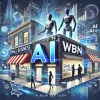
WBN " The Work Recode Series " explores the changing relationship between people, jobs, machines, and AI
By Elke Porter | The Work Recode Series Column | June 3, 2025
Subscription to WBN and being a Contributor is FREE!
The Great Education Shift: Teachers Face AI's Double-Edged Promise
Jobs are vanishing—but the future is hiring.
REPLACED THIS WEEK
The traditional classroom is experiencing its most significant disruption since the printing press. Forty percent of elementary school teachers' work could be automated by 2030, according to McKinsey Global Institute predictions that are now playing out in real-time across North American schools.
Alpha School in Brownsville, Texas represents the extreme edge of this transformation. The school promises to deliver a full day's worth of instruction in just two hours with AI tutors, essentially eliminating traditional teaching roles for core academic subjects. This isn't theoretical—it's happening now, with startling results that challenge everything we know about education delivery.
ROLES REWIRED
The teaching profession isn't disappearing—it's splitting into entirely new categories. In the fall of 2024, 48 percent of districts reported they had trained teachers on AI use—up from 23 percent in the fall of 2023, according to RAND Corporation data. This massive training surge signals a fundamental shift in teacher responsibilities.
Three emerging teacher archetypes:
- AI Facilitators: Managing AI-powered learning environments
- Human-AI Collaboration Specialists: Combining AI efficiency with emotional intelligence
- Digital Learning Architects: Designing personalized AI-assisted curricula
Forty-three percent of teachers said they have received at least one training session on AI, representing a 50% increase from spring 2024. Yet most teachers remain hesitant to fully integrate AI tools, creating a skills gap that will determine career survival.
NEW JOBS WATCH
The education sector is generating job categories that didn't exist five years ago:
EdTech AI Specialists: Companies desperately need professionals who understand both pedagogy and AI implementation. Salaries range from $75,000-$150,000 annually.
Learning Experience Designers: Professionals who create AI-enhanced educational pathways. These roles blend psychology, technology, and curriculum development.
AI Ethics in Education Consultants: As schools grapple with AI's impact on academic integrity and student development, specialists who can navigate these ethical minefields are in high demand.
Student Data Analysts: With AI generating unprecedented amounts of learning data, schools need professionals who can translate analytics into actionable educational strategies.
DESPERATELY NEEDED: Early Childhood AI Literacy Specialists
The most critical gap in education's AI transformation is at the beginning: teaching our youngest learners responsible AI use. Research has shown that children even as young as preschool-aged can be taught AI literacy, which helps them more effectively assess the strengths and limitations of AI, according to Harvard Graduate School of Education research.
Yet this crucial early intervention is barely happening. The demand for Early Childhood AI Literacy Specialists represents one of education's most urgent hiring needs:
What they do:
- Develop age-appropriate AI literacy curricula for ages 3-6
- Train preschool and kindergarten teachers on AI integration
- Create ethical frameworks for AI use with young children
- Design play-based learning experiences that teach AI concepts
INDUSTRY FOCUS: K-12 vs. Higher Education
Elementary and High Schools are moving cautiously. There is optimism about artificial intelligence's productivity gains amid worry about inappropriate student use. The focus remains on AI as a teaching assistant rather than replacement.
Universities and Colleges are embracing AI more aggressively, particularly in:
- Automated grading and feedback systems
- AI-powered research assistance
- Personalized learning pathways
- Administrative automation
The divide creates different employment impacts across education levels.
PEOPLE PROFILE: The Adaptation Challenge
Sarah Martinez, a 15-year veteran math teacher in Vancouver, represents thousands of educators navigating this transition. After completing AI training in fall 2024, she now uses ChatGPT to generate practice problems and provides feedback through AI-assisted tools. Her role shifted from content delivery to learning facilitation—a change that saved her career while transforming it completely.
Meanwhile, Alex Chen, a recent education graduate, entered the field as an "AI-native" teacher, building lesson plans around AI tools from day one. The generational divide in AI adoption is creating two distinct teaching populations with vastly different career trajectories.
Why It Matters
For Entrepreneurs: The $10 trillion education market is ripe for disruption. Companies developing AI tutoring, teacher training platforms, and educational analytics are seeing explosive growth. Small businesses can capitalize by offering specialized AI training for schools or developing niche educational AI applications.
For Employees: Teachers must embrace AI integration or risk obsolescence. The data shows that trained educators are thriving, while those avoiding AI face diminishing career prospects. Immediate action: seek AI certification programs and experiment with approved AI tools in your classroom.
For Employers: Schools and educational institutions need comprehensive AI strategies now. This includes teacher training, ethical guidelines, and technology infrastructure. The districts investing in AI education today will attract the best talent and deliver superior outcomes tomorrow.
For Policymakers: The rapid pace of AI adoption in education demands immediate regulatory frameworks. Student privacy, educational equity, and teacher employment protection require urgent legislative attention. Presidential executive orders on advancing AI education represent the beginning, not the end, of necessary policy interventions.
The education sector's AI transformation isn't a distant future—it's the current reality reshaping classrooms across North America. The question isn't whether AI will change education, but whether educators and institutions will adapt quickly enough to harness its potential while preserving education's human heart.
#Recode Series #AI at Work #The Work Recode #North American Education #Education AI #Job Transformation #Future Of Work #WBN News Global #WBN Ai #Elke Porter
Sources:
- EdWeek: More Teachers Than Ever Before Are Trained on AI
- EdWeek: Forty Percent of Elementary School Teachers' Work Could Be Automated
- Newsweek: What Happens When Teachers Are Replaced With AI?
- EdTech Magazine: AI in Education in 2024
- White House: Advancing Artificial Intelligence Education
Connect with Elke at Westcoast German Media or on LinkedIn: Elke Porter or contact her on WhatsApp: +1 604 828 8788


